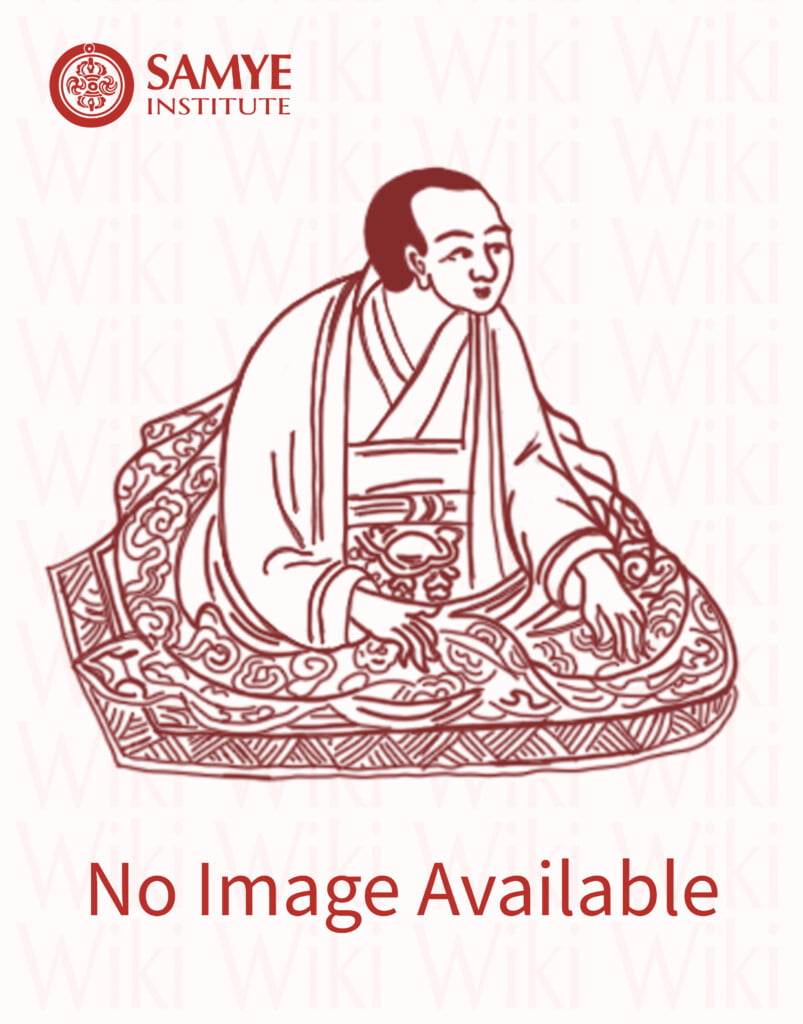Tsewang Norbu (1856-1915/6) was the second son of tertön Chokgyur Dechen Lingpa. He is said to be the incarnation of one of the original 25 disciples of Guru Rinpoche, the translator, and scholar Yudra Nyingpo. As that incarnation he became the lineage holder of the Dzogchen Desum.
Incarnation of Yudra Nyingpo, Tsewang Norbu
Tsewang Norbu (Precious Longevity) was another of Chokgyur Lingpa’s sons, born to his second consort, the niece of Jamyang Khyentsé Wangpo. Up until he was about twelve months old, an eagle came to perch on the roof of his parents’ house every single day. Later, Jamyang Khyentsé said that this was Shokgöma, the Eagle-Winged Goddess, one of the guardians of the Three Sections of the Great Perfection.
When the Three Sections of the Great Perfection was transmitted for the very first time, there were twenty-five people present. Kongtrül, Karmé Khenpo and, of course, Jamyang Khyentsé were all there. Because this terma was the heart essence of Vairocana, and since Yudra Nyingpo had been his foremost disciple in Kham, the reincarnation of Yudra Nyingpo had to be the first to receive the empowerment. So, as soon as the terma had been revealed, Khyentsé wrote it down and Chokgyur Lingpa immediately conferred the empowerment on the infant Tsewang Norbu, no more than six months old at the time. This was even predicted in the terma itself. Later, when Tsewang Norbu grew up, he remembered receiving the Three Sections of the Great Perfection. In his own words, “I will never forget lying there, in my basket, wrapped in sheepskin, between Chokgyur Lingpa and Jamyang Khyentsé, and receiving the Three Sections empowerments. I can still remember it as clear as day.”
Tsewang Norbu became exceptionally learned, almost equal to Karmé Khenpo, but he put this down to having spent his early years with Jamyang Khyentsé. He said, “Staying with Khyentsé when I was young made me a wealthy man — rich with teachings.” He was also quite eccentric, with a very direct yogi type of personality. During the first half of his life he was a monk, but later Jamyang Khyentsé and Kongtrül took back his vows and he became a mantrika (ngakpa). He had two consorts but no sons.
I have heard that he later said, “Darn! I totally missed out in this life! I didn’t get to keep my monk’s vows, nor did I get any children by giving up my vows. I’ve been a total failure!” Upon hearing remarks like this, other lamas would often be quite unsettled by his deadpan humor.
Nor did Tsewang Norbu ever listen when a dignitary or high lama told him to do something. When Karmapa Khakyab Dorjé asked him for the transmissions of the Chokling Tersar, he could not be persuaded to give them to him. Karmapa is Avalokiteśvara in the flesh, so who wouldn’t rejoice in giving him Chokgyur Lingpa’s termas as an offering? But Tsewang Norbu never did.
He was also a disciple of Patrül Rinpoché. Once, in Kham, he went up the mountain for a short stay in a cave, taking just a small bag of tsampa (barley flour). One night there was a heavy snowfall and he was snowed in for the next six months. Word went around in Patrül’s camp that Tsewang Norbu had perished. Since it was assumed that he couldn’t have survived, virtuous acts were done in his name. Six months later, when the snow began to melt, Tsewang Norbu walked into the camp. Someone asked him, “How is it you didn’t starve to death?” He replied, “Why would I have starved to death? When I was thirsty I ate snow, and when I was hungry I ate from my bag of tsampa. Everyday I ate a spoonful. So why would I die when I had tsampa to eat and water to drink? People don’t die when they have provisions, do they?” In other words, he wouldn’t admit to a thing. The truth is he had attained mastery in yoga, and had full control over the channels and energies.
Tsewang Norbu also had amazing clairvoyant powers, to such an extent that he sometimes frightened people. Once at Riwoché, after conferring the empowerments of the Treasury of Precious Terma, he went straight on to transmit the Chokling Tersar. He told the lamas present — Tsiké Chokling, Neten Chokling, Samten Gyatso, and Tersé Tulku — “When I die, don’t search for my reincarnation! In my next life, I will be spontaneously working on my own for Chokgyur Lingpa’s teachings. Under no circumstances should you try to find me! Promise me that, all of you!” So the four of them had to swear not to look for his tulku.
Tulku Urgyen Rinpoche in The Great Tertön: The Life and Activities of Chokgyur Lingpa, Lhasey Lotsawa Translations, 2016, pp. 368-71.
Supplication to Tsewang Norbu
རྒྱལ་ཀུན་དགོངས་བཅུད་སྔ་འགྱུར་བཟང་པོའི་བསྟན། །
gyel kün gong chü ngagyur zangpö ten
With teaching and practice fearless and brave,བཤད་སྒྲུབ་འཇིགས་མེད་སྤོབས་པའི་ཕྲིན་ལས་ཀྱིས། །
shedrup jikmé popé trinlé kyi
you hold the heart essence of victors, the Early Translations’ great doctrine—འཛིན་མཛད་ཚེ་དབང་པདྨས་བྱིན་བརླབས་པའི། །
dzin dzé tsewang pemé jinlapé
longevity master (Tsewang), Sky Jewel (Namkhé Norbu),བཤེས་གཉེན་ནམ་མཁའི་ནོར་བུར་གསོལ་བ་འདེབས། །
shenyen namkhé norbur sölwa dep
virtuous friend by Padma blessed—I supplicate you.རང་རིག་བླ་མར་ཤེས་པའི་མོས་གུས་ཀྱིས། །
rang rik lamar shepé mögü kyi
With devotion that knows self-awarenessཐུགས་ཡིད་གཅིག་ཏུ་བསྲེ་བའི་ཉམས་ལེན་ལ། །
tuk yi chik tu sewé nyamlen la
to be the very guru, may I always strive in the practiceརྟག་ཏུ་བརྩོན་པའི་སྟོབས་ལས་གནས་ལུགས་དོན། །
tak tu tsönpé top lé neluk dön
of mingling his wisdom with my mind, as one,ཚུལ་བཞིན་རྟོགས་པའི་ས་ལ་རེག་པར་ཤོག །
tsül zhin tokpé sa la rekpar shok
and thus truly realize the natural state as it is.རྗེ་ཉིད་ཀྱི་ཞལ་གསུང་ངོ༌། །
From Supplications to the Chokling Tersar Lineage Gurus, Rangjung Yeshe & Lhasey Lotsawa Translations (trans. Erik Pema Kunsang, checked against the Tibetan by Laura Dainty and Oriane Sherap Lhamo, and ed. by Libby Hogg), June 2020.
Composed by the Lord himself.


